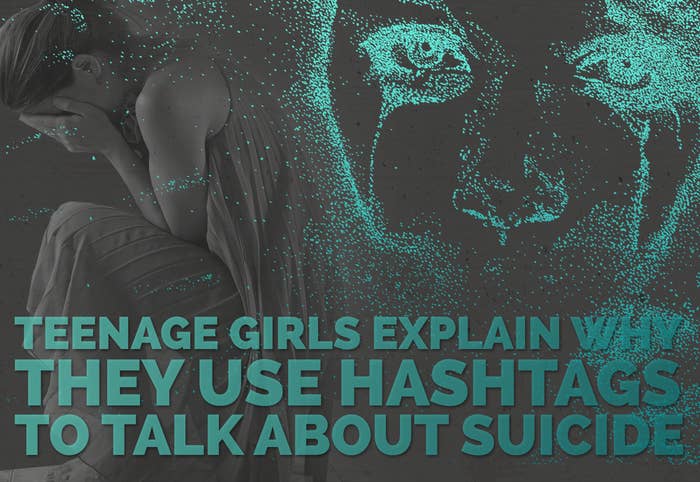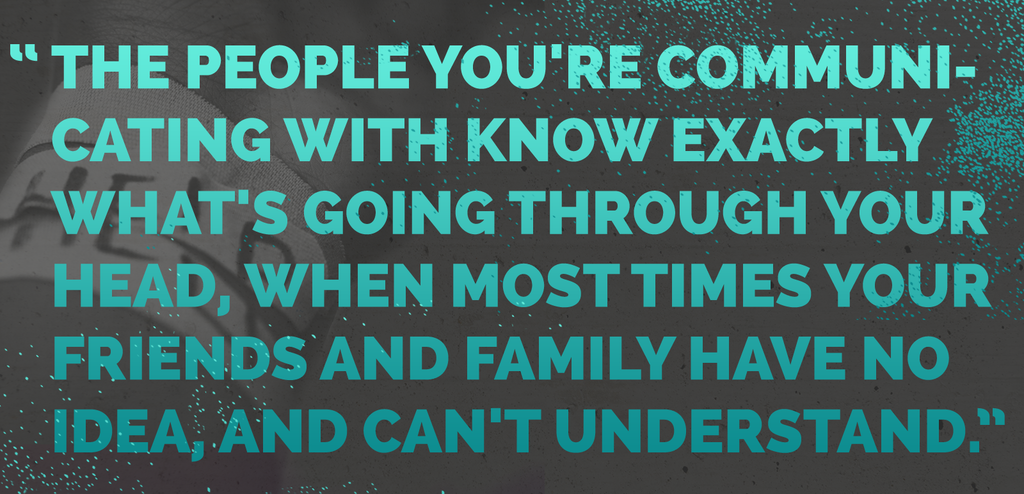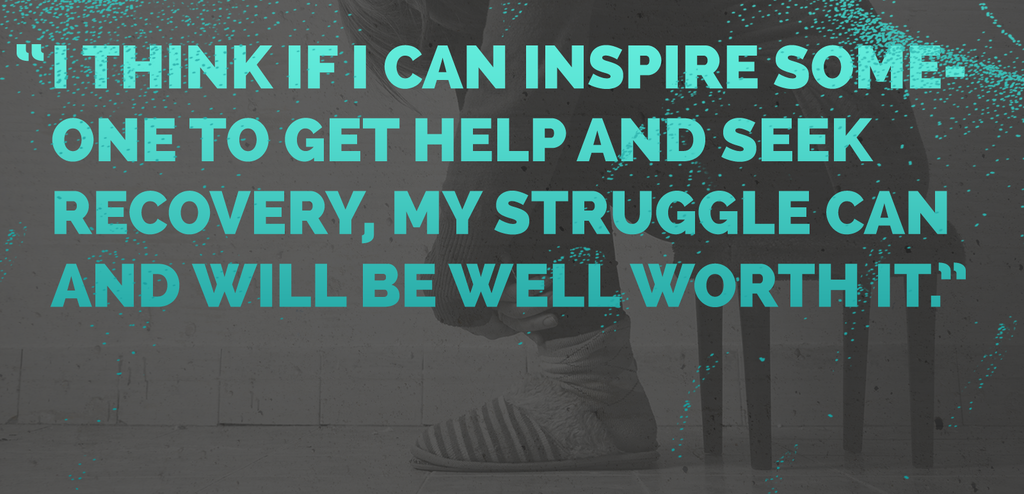
In September, BuzzFeed published an article on the ways young people are using hashtags on social media to talk about depression and self-harm. Websites and apps like Tumblr, Instagram, and Twitter are now tools for discussing these kinds of issues within communities of teens, who use codewords like #sue and #secretsociety123 to quietly connect with other people who share their feelings about suicide.
After the article was published, three young women who were interested in talking about their use of suicide-related hashtags reached out to me.
Isabel is a 17-year-old from Austin, Texas; Annie is a 14-year-old from Ohio; and Zoe is a 19-year-old from England.
On which specific hashtags they use online:
Isabel: "I usually use Instagram since my parents and relatives aren't on it. If they were to see it, it would spark a conversation I don't want to have. I'm really inspired by Demi Lovato, so I speak out about my struggles with depression, anxiety, suicide, anorexia, and self-harm on a monthly basis. I think if I can inspire someone to get help and seek recovery, my struggle can and will be well worth it. I do a post on Instagram every so often about the issues listed above. I usually use #SecretSociety123 and other hashtags like #Sue #SelfHarmmm and #Ana, depending on the subject matter."
Annie: "The hashtags on Tumblr aren't disguised. I look more than post, but the few things I have are reblogged. Their hashtags are along the lines of #alone #relapse #noonearound. But the really popular ones in the self-harm, eating disorder, and depression loop are #cutting #depressed #scars #broken #sad #worthless."
Zoe: "I use a variety of tags. When I'm posting, it's things like: suicide, suicidal, depression, MDD (which stands for major depressive disorder), OD or overdose, fat, lonely, or kill me. When I'm just browsing, then it varies; if I'm looking for something to cheer me up I'll go for things like: funny, happy, laugh, random facts. Sometimes when I'm browsing and in a worse mood than normal, it will be things like: depression, MDD, cut, bleeding, suicidal."
On how they discovered these hashtags:
Isabel: "I follow a lot of self-harm and anorexia accounts on Instagram. I also have a blog on Tumblr that I used often when I was deeply depressed. I have been using them for about over six months."
Annie: "I stumbled into these hashtags when I first started looking for a way to deal with various problems I was having. I was already self-harming and I was looking up depression-related media when the Tumblr results came up. I've used Tumblr for about a year and a half."
Zoe: "I found Tumblr a while ago and had been using it to keep up-to-date with TV shows and that kind of thing before I realized that I'm not alone in my depression and other people are going through that kind of thing too. After a quick Tumblr search, I felt a lot less alone. I saw how lonely people are and wanted to be there for anyone who needed someone to talk to, so I started my blog in 2012. I've been using Tumblr to look at these kind of tags since probably around 2011."

On what they post using the hashtags:
Isabel: "I usually post quotes, but once I posted a picture of my scars. I got a lot of backlash for it, so I never did it again. My family and my boyfriend's family have problems with us being honest about our mental illnesses like depression, anxiety, etc. My boyfriend's sister yells at him when he talks about how he was in treatment for anger management. I guess they just aren't OK with us being fucked up. My little sister was caught cutting herself and was sent to therapy, but she quit after two weeks and she gets violent if I talk about it."
Annie: "I reblog the things that have personal ties with me. Quotes are pretty much the main thing. I could never post pictures of myself because the people I'm close to can never know, and I would certainly never post pictures of my cuts or my scars because I don't think they're good for people. Cutting is romanticized — Tumblr is flooded with sentiments like 'I would love a boy with scars' and 'My scars are beautiful,' and I think it's awful, because you're destroying yourself when you cut. It is terrible, not romantic."
Zoe: "It varies. Sometimes I post funny pictures to try and make others laugh, but mostly I just write about how I'm feeling. It's nice to have such an accepting place where I can talk about mental health problems, and even if no one reads them, it does help to get it all out. If someone messages me anonymously I will reply to everything and post that, but if someone messages me off anonymous then I will answer privately unless they say otherwise."
On feeling a sense of community within the hashtags:
Isabel: "I don't really feel a sense of community with the hashtags; in fact, they scare me. The online community of depressed and suicidal teenagers is astoundingly large. I know that some of them will make it into recovery and be able to live normal, healthy lives. But not all of them will, and that terrifies me."
Annie: "The hashtags do give a sense of community. Self-harm is a lonely thing; you don't tell people you know about it. It just gives you a small comfort that there are people just like you going through the same thing, somewhere, posting things that hit so close emotionally. It's especially nice to read a blog and see someone doing well because it gives you hope that you can too. But the flip side is for every good thing, there are more bad things, more depressing pictures, more dark thoughts that can make you start thinking them again."
Zoe: "They really have given me a community to turn to. If I'm having a terrible day, they let me know that I'm not alone and that other people are going through the same sort of thing that I am. If I'm having side effects from my medication, then I can see if they are normal size effects or if I should do something about it."
On preferring to talk about suicide in real life vs. online:
Isabel: "I've been seeing a therapist for six years now, and she has helped so much. I talk openly about it in public — I'd never hide it. I don't prefer one or the other, but I do like being able to reach out to people I normally wouldn't see in real life. If there's a chance I can help, I will speak without a second thought, which my family isn't too fond of."
Annie: "I recently reached out to get counseling at school. My parents know, but they don't understand, and they think I can get through it alone but I can't. I talk about cutting; my self-harm isn't suicidal. Most times it isn't suicidal and people hurt themselves for different reasons. I do it to calm down or when I've done something wrong to make the guilt go away. I prefer to talk about depression, suicide, and self-harm online because I'm anonymous. It's surprisingly private when you're talking to strangers, because they don't know you and you don't know them in real life. And the people you're communicating with know exactly what's going through your head, when most times your friends and family have no idea and can't understand."
Zoe: "I spoke to a counselor about my problems for about two years when I was 16 but I don't think it really helped. I have a couple of people in real life who I can talk to but I feel like I am putting a burden on them, so I generally would rather not. Mostly I use the internet; I much prefer to talk about it online. It's anonymous so my family can't find out, and everyone I have encountered on the internet are loving and non-judgmental. If someone were to come across any of my posts, it is because they are searching for those tags so they want to hear about my experience with depression which doesn't make me feel like I'm a burden.

On whether or not the hashtags are helpful:
Annie: "The hashtags are an outlet. They bring some relief, but it's more of knowing that there are people out there who understand, because many people don't. Those people know that self-harm is not a cry for attention, it's not a joke, or a phase, or something that will go away."
Isabel: "I do find the hashtags helpful because they help me find people I may be able to reach out to and save. In my experience, these hashtags and photos are a cry for help. When someone sees a picture of a slashed up wrist, most people think, Wow, the lengths these kids will go to for attention. All they want is for someone to tell them that they're beautiful, scars and all, and to try to understand. In addition to that, I have heard most of my family and some friends claim that I speak out for attention. This is half true. I want to bring attention to those struggling. I want the ones who love them to see the signs and try to help them. I want every single kid like me to find the light at the end of the tunnel."
Zoe: "I feel like they're definitely an outlet and give me a sense of relief, to be honest. It's somewhere I can just let everything out and it's great when I can't talk to anyone or don't want to talk to anyone."
On their personal experiences with hashtags, depression, and self-harm:
Isabel: "Most people don't understand the causes of depression and suicidal tendencies, and therefore do not understand those conditions. Some people, like me, are born with clinical depression. Some develop it. The same also goes with anxiety; I developed horrible anxiety after one of my best friends assaulted me, and it's been very hard to live with. I've had to move out of my house because my brother and sister tease me about it, and I get horrible panic attacks. Anything can trigger them, though certain comments are the main cause. I've met a lot of people online who've been through things like that, and that is part of what triggered their self-destructive behavior. I've been able to stop cutting, drinking, and smoking for the first time in several weeks. My cutting habit was the worst. I slashed my body up for five years on and off. I'm covered in faded scars. In the end, I love my scars. I know that sounds horrible, but I do. Most people view them as a sign of cowardice, an ugly reminder that I tried to take the easy way out. But I don't think of them like that. They are battle scars, a sign that I am a fighter, and I am proud of my perseverance. And why shouldn't I be? I will never hide them."
Annie: "I'm a straight-A student, I play in the school marching band, and I come from a stable family. Nobody would ever think of me as being someone who cuts, but I do. No one would think I have problems like that. Those pictures sometimes are the closest thing to an explanation you could give anybody if they found out. It's something you have to hide everywhere but the internet, because on the internet nobody knows who you are. You can tell people how you feel without being afraid. People can confess that they've relapsed and not get punished or rejected. It makes it easier, and sometimes it makes it worse. People can see these things, do it, and get seriously hurt. They get the wrong ideas."
Zoe: "I have struggled with depression, suicidal idealization, and an eating disorder since I was 9, and I've managed to hide it from everyone until two years ago, when I finally sought professional help. Since then, it has been a whirlwind; without the support of my followers online and being able to talk to people on Tumblr about what is going on, I honestly believe I would have killed myself by now. It also helps me help others who are going through some of the same things that I am. I am going into a career in psychology, but that requires about 10 years of training. Using the hashtags online is one way I can start helping people now, and so far I have stopped three people from committing suicide to my knowledge. That's really helped, me and hopefully them too."
If you or someone you know is going through a rough time, feeling depressed, or thinking about self-harm, you can call the National Suicide Prevention Lifeline at 1-800-273-8255 or visit its website. You can also head over to ReachOut.com and check out some of the organization's resources.
